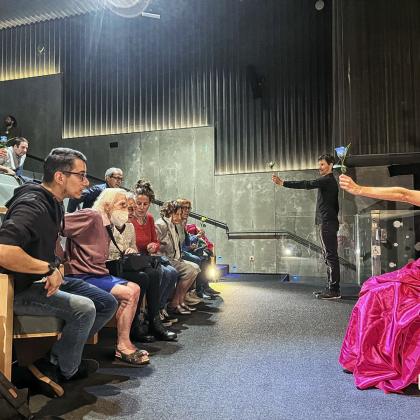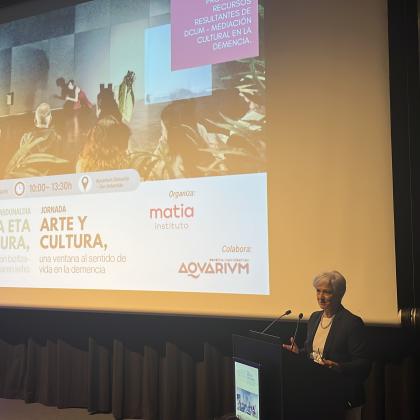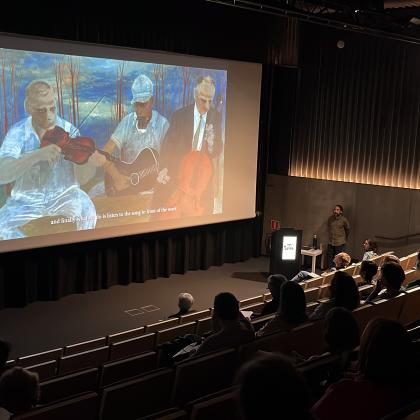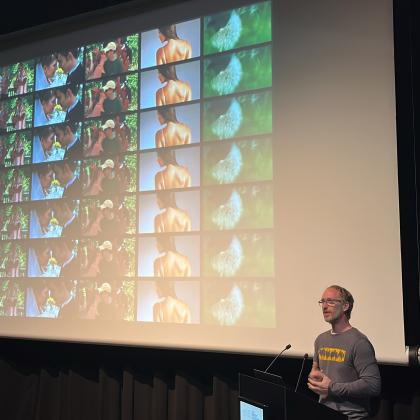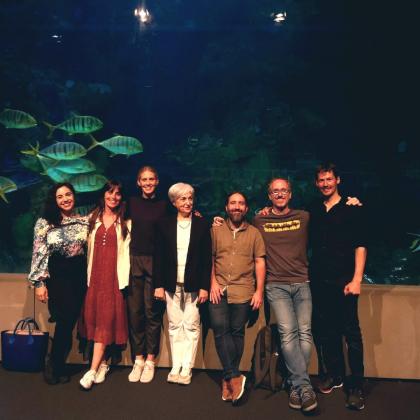- The meeting serves as the closing event of the European project DCUM, an initiative that over three years has explored artistic and cultural practice in the field of dementia in four EU countries: Denmark, Belgium, the Netherlands and Spain.
- During the event, a group of people with dementia, their families and carers were able to enjoy various photography and dance activities.
On 8th June, the event "Art and culture, a window to the meaning of life in dementia" took place in Donostia, which brought together more than fifty people from different communities in Spain in the auditorium of the Aquarium, where the results and materials generated within the framework of the project 'Dementia in Cultural Mediation' (DCUM) were presented.
This initiative, which is part of the European Erasmus+ programme, is based on the idea that the use of culture and cultural activities can be an excellent way for the social inclusion of people with dementia in their immediate environment, favouring the generation of social networks within the framework of these activities, and helping to improve the self-esteem, sense of belonging and joy of life of these people.
In the words of Mari Carmen Garmendia, president of the Matia Board of Trustees, "The celebration of this day marks a milestone in the approach to the lives of people with dementia and their social inclusion from worlds that seem to have been distancing themselves from them, such as art and culture. Those of us who attended the event felt a strong identification with what was being proposed. So much so, that there were people who could not contain their emotion, and at the end of the event many thanked us for setting up this activity, which we hope will continue in the future".
For his part, another of the participants in the event, Iker Arrue, dancer and director of the company AiDoProject, said at the end of the event: "I believe that we have managed to transmit the essence of the work that we develop, through music and movement, in the Invisible Beauty project.
As James Rhodes describes in his biography, music has the ability to reach the very recesses of our hearts and minds. It only takes a few notes to transport us back in time, to relive an emotion or a memory, or simply to change our emotional state. If, in addition, as the dancers that we are, we manage to accompany it with the rest of the elements that make up the stage experience (lighting, costumes, the movement itself in our case...) the emotional impact on the participants is much greater and the experience becomes something intimate, almost personal. Today we have tried to share this again with the audience and it has been beautiful to observe their reactions".
Iker was also grateful for the opportunity to participate in this initiative, and for the recent winner of the Gipuzkoa dance award, "collaborating with organisations of the stature of Matia in projects like this one is always revealing and for us, of course, a gift".
The conference also featured the participation of David Viñuales, founding partner of Instituto 8 and lecturer at the University of Barcelona, who shared some of the keys to his methodology using images to work with people affected by Alzheimer's and other dementias.
During his presentation, attendees were able to see and test how a simple and straightforward photograph can become a surprising tool to break down communication barriers and address vital changes.
For David, the day turned out to be "an initiative with inspiring results for an increasingly visual and connected society".
DCUM project
At the end of 2019, the project 'Dementia in Cultural Mediation', an initiative in the framework of the European Erasmus+ programme, started in Odense (Denmark), which aims to collect information on the different artistic and cultural activities involving people with dementia in four European Union countries: Denmark, Belgium, the Netherlands and Spain.
The project is based on the idea that the use of culture and cultural activities can be a good approach to favour the social inclusion of people with dementia in their immediate environment. Hence the importance of improving the competences and skills of cultural mediators who work or have some relation with cultural institutions (such as libraries, museums and social organisations) where there is an interest in organising cultural activities adapted to people living with dementia.
In addition to the partners, the project has established a European reference group, including Matia, composed of highly recognised experts in the fields of dementia and culture in each participating country, as well as representatives of the end-users, such as: teachers, informal carers, activity coordinators and dementia counsellors, etc.
Throughout the project, meetings have taken place in which partners have exchanged activities, tools, ideas... to facilitate the generation of an easily accessible toolkit, which compiles good practices, not only for the participating partners but for all organisations and cultural mediators interested in new practical methods for cultural mediation for people with dementia. This Toolkit consists of presentations and instructional videos and images, as well as guides to support the use of each method.
More details of the project and its resulting materials can be found on the website: https://dementiainculturalmediation.eu/

